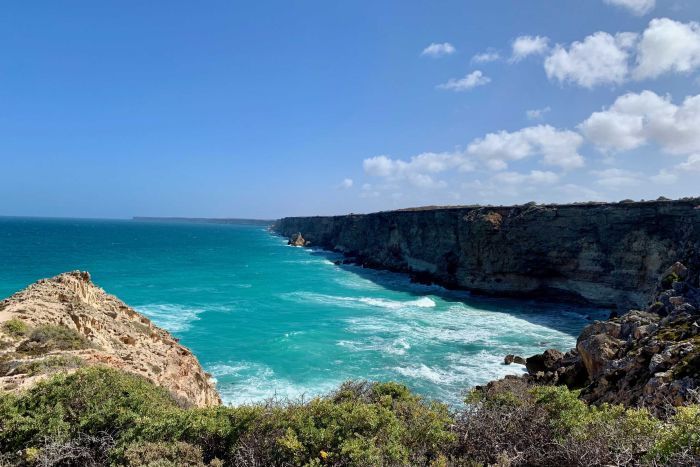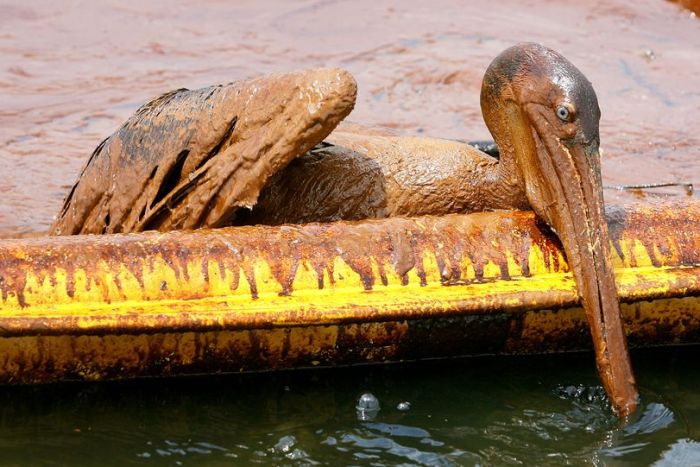
Oil price slump won't stop push to drill in Bight
Posted

Photo:
Equinor plans to drill for oil in the Great Australian Bight in 2020. (ABC News: Gary-Jon Lysaght)
An international slump in oil prices due to trade tensions between the United States and China is unlikely to deter a Norwegian company from drilling for oil in the Great Australian Bight.
Key points:
- Oil prices have fallen $US73 to $US60 a barrel
- Equinor says it future-proofs its projects against falls in oil prices
- A ruling on the oil-drilling proposal is due June 27
The company, Equinor, has launched an application to drill off the coast of South Australia with plans to begin in 2020.
The proposal has drawn widespread debate with criticism partly based on the potential impact an oil spill could have on the state’s aquaculture industry.
It has not been the first time companies have sought to drill in the Bight, with BP and Chevron also planning to drill in the past.
Chevron chose to not drill for oil in late 2017, citing low oil prices.
University of New South Wales economist, Tim Harcourt, said the price of crude oil has dropped by nearly 20 per cent in the past weeks, adding it was due to trade tensions between the US and China.
The US has imposed heavy tariffs on Chinese imports, with a Chinese retaliation in May having a huge impact on the Dow Jones.
Mr Harcourt said a Chinese negative response to the US tariffs hike would have a “catastrophic” effect on growth.
“It’s something that would impact on Australia, in particular, as a small open economy,” he said.
“The biggest concern for us would be if it became an all-out trade war, like it did during the Great Depression, where most economies hiked up their tariffs.
“Another danger for us is if the US and China do a deal and they manage trade between them — that could also cut Australia out of the market.”
Mr Harcourt said the best option, if tariffs were inevitable, was “one with minimal tariffs where there’s a bit of trade peace around”.
Oil slump unlikely to deter
Mr Harcourt said the oil slump, which has seen prices fall in recent weeks from $US73 to $US60 a barrel, was unlikely to affect Equinor’s plans to drill for oil in the Bight.
“Economic history shows that exploration tends to go on,” he said.
“They [companies] generally think they’re short-term fluctuations in prices and they see it as long-term investment.”
Mr Harcourt pointed to oil exploration in the Bass Strait and off the Norwegian coastline as examples of exploration continuing, despite low prices.
“Generally, they still go ahead even when the price of oil is really low,” he said
Mr Harcourt said, because of this, it was unlikely Equinor would reconsider its plans to drill for oil in the Bight.

Photo:
More than 400 new marine species were recently discovered in the Great Australian Bight. (ABC News: Samantha Jonscher)
“If there was an environmental impact that concerned them, I think that’s the only thing that would stop them,” he said.
“Norway’s got a pretty good record in terms of environmental safety and sustainability for oil explorations.
“I’d imagine they’d be really careful with the environmental impact and that would matter a lot more to them in the long-term than fluctuations in oil prices in the short-term.”
Geopolitics won’t stop oil exploration
Equinor said it had seen volatility in the worldwide oil price.
“Geopolitics will continue to impact this, however we still expect oil demand to grow in 2019,” it said.
“In Equinor we have built a portfolio that is resilient also in lower oil prices.
“When we develop our project and exploration plans we have a perspective of several decades, and short-term changes in oil price does not directly influence our long-term plans.
The company said it still wanted to begin drilling off the SA coastline by the end of 2020.
Not worth the risk
The Australian Southern Bluefin Tuna Industry Association has been a constant opponent to drilling in the Bight.

Photo:
Brian Jeffriess, left, is chief executive of the Australian Southern Bluefin Tuna Association. (ABC News: Samantha Jonscher)
Its chief executive, Brian Jeffriess, said the economic benefits of aquaculture and tourism in the Bight far outweighed anything the oil industry had to offer.
“Tuna fishing is a sustainable, renewable industry and, provided it is looked after, it will be there forever,” he said.
“Equinor’s always been quite clear this oil would be shipped direct from the well offshore and there’d be no onshore benefits to South Australia.
“It’s very difficult to contemplate that there’s any real benefits to Australia, compared with the benefits we’re currently producing by the major fishing industries and tourist infrastructure.”
Mr Jeffriess said he would not be surprised if Equinor ended up pulling out of the Bight.
“BP, which went the furthest, pulled out because they have a lot of other projects around the world which are much easier to exploit,” he said.
Mr Jeffriess said Equinor might come to the same conclusion and, in the meantime, oil exploration in the Bight was not worth the risk.

Photo:
Mr Jeffriess said the aquaculture and tourism industries are far more beneficial to the SA economy than oil drilling. (ABC News: Samantha Jonscher)
“The worst two oil spills in history have both been in the last 10 years and one was in the Australian zone,” he said.
“Equinor has done a very good job around the world of having large-scale reserves in a whole range of countries — they don’t need the Great Australian Bight.
“They don’t need to transfer the risks from the seas in the Northern Hemisphere to the Great Australian Bight.”
Equinor proving to be a safe operator
Kangaroo Island Mayor Michael Pengilly said Equinor was used to operating in waters similar to the Bight.
“Equinor is by far the most professional company I’ve had to deal with over this matter,” he said.
Mr Pengilly said comparisons with the Deepwater Horizon oil spill in the Gulf of Mexico were not warranted.
“This is not the Gulf of Mexico, it’s the Great Australian Bight,” he said.
“The industry learnt a lot from that debacle — it never should’ve happened.
“We’re probably a couple hundred years away from being anywhere distant from fossil fuels. It’s the mainstream of our economy.”

Photo:
The Deepwater Horizon oil spill in 2010 killed more than 1,000 marine mammals. (Sean Gardner: Reuters)
The National Offshore Petroleum Safety and Environmental Management Authority (NOPSEMA) is the offshore drilling regulator.
Equinor has submitted its environmental plan to NOPSEMA for approval with an expected verdict on June 27.
Topics:
international-financial-institutions,
university-of-new-south-wales-2052,


